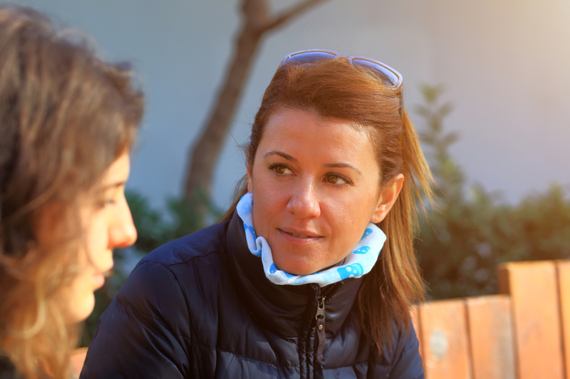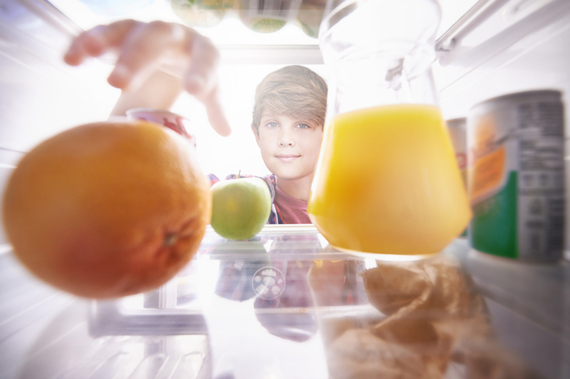Anyone who spends time with young people may eventually hear a far too familiar refrain -- "I'm so fat!"
While as adults we may think it's reasonable to complain about our own bodies' bumps and lumps, when someone who may be half our own age complains, suddenly it seems clear to us something is seriously off about their self image.
So what can we, as mothers, do?
The problem is serious, and starts young. More than half of girls, and approximately a third of boys, ages 6 to 8, say they are too fat, according to a study by Common Sense Media. By their teen years, the same percentages of girls and boys are controlling their weight through behaviors associated with eating disorders. That's not to say that addressing weight issues isn't critically called for at a time when 13 million children are tipping the scales in the obesity range.
"It's a real dilemma for a parent to know how much to say, what exactly to say, how concerned they should be and what to do about it,'' Dr. Dianne Neumark-Sztainer, an epidemiologist at the University of Minnesota told the New York Times. Talking to kids about weight can, the article said, be like backing into a tight parking space: proceed cautiously, constantly adjust your aim and listen for a crashing sound.
The good news is that, while talking to kids is important, there is something far less complicated, though not always instinctive, we can do every day: model healthy behavior. Words matter too.
Studies have shown kids learn, not from what parents say, but from what they do. Young children who think their mothers are unhappy with their bodies are far more likely to be dissatisfied with their own, according to the Common Sense Media's report. No matter what you think about your body or food, be cautious about "going negative" in front of your kids.
It's not too hard to imagine why the battle of the bulge can be such an easy fault line for moms. Take trying on clothes, for example. When shopping for clothes or picking out an outfit, it may be the most natural thing in the world to point out that a certain outfit makes you look fat. It's harder to remember your daughter is watching and learning, even if she's laughing or trying to convince you otherwise with lines like "Mom, you look fine. Get over it!" This kind of cheerleading is a common refrain from sons and daughters of self-deprecating moms, but the long-term consequences may make us regret such antics. And, when your children are off on their own, making their own daily decisions, you may wish you could take it all back.
To be sure, constantly modeling healthy attitudes and behavior is a tall order. The same forces that cause a young girl or boy to think they're overweight have been shaping our own self-images since childhood. I am grateful my mother modeled a positive and accepting attitude toward her body. And I've tried to continue this with my own children. But if I'm being totally honest, I haven't always batted a thousand in this department.
But it's never too late to start modeling positive behavior and there are practical things we can do to prompt behavioral change whether our kids and grandkids are still living with us or just visiting for the weekend. Here's one you can implement right away: change your environment to increase the chances you - and your family -- will eat healthfully. In other words, storm the pantry.
Why? A recent experiment at Google headquarters -- where the company provides its employees with free meals and snacks -- found that slight changes in food presentation had a huge impact on the employees' food choices, according to Laszlo Bock, author and head of Google's People Ops.
Initially, healthy snacks and candy were displayed in the Google kitchens as equal choices. Because "Google employees are human," they ate a lot of candy, Bock said. But after Bock displayed the health snacks in see-through containers, and the candy and sweet treats in opaque canisters, Googlers ate 3.1 million fewer calories over a 7-week period, enough to avoid gaining a cumulative 885 pounds.
Can we do this at home? Of course. A little rebellion against our refrigerators might go a long way in establishing new precedents for ourselves and future generations.
When you look inside your fridge, what do you and your children see?
Do the shelves display leftovers and goodies, while the drawers hide the raw veggies and fruit? If yes, then the refrigerator is set us up to make bad food decisions. So, instead, try displaying raw veggies in clear containers an drawers.
Cabinets can be organized with the same approach. Put healthy snacks at eye level and poorer choices on inconveniently higher shelves or get them out of the house. It's your home, it's your call. A fruit bowl on the counter or high-protein bars and what we've deemed in our menu portfolio "smart snacks" may circumvent peeking or sneaking into the cabinet altogether.
It probably goes without saying that none of us is ever going to always say just the right thing at just the right time in front of our children. Nor am I suggesting we need or want to manage their diet down to the calorie post infancy. But, understanding that positive role modeling and behavior modification based on the cue theory of consumption are some of the most meaningful ways we can lovingly support the health and well-being of our children, is more than worthwhile. It's an endeavor thousands of mothers we work with undertake daily and we salute them for the courageous and admirable choice they've made to lose weight and take charge of their own health. Time and time again, with tears in their eyes, moms will tell us one of the single biggest motivating factors for losing weight whether its 10 pound or 100 is, "my kids." Are there two more powerful words? Not in my book.
This Mother's Day, take stock of your own words and actions and take solace in the fact that making small changes can have a great impact on our children's self image, eating habits and long-term health. I can't think of anything more motivating.






